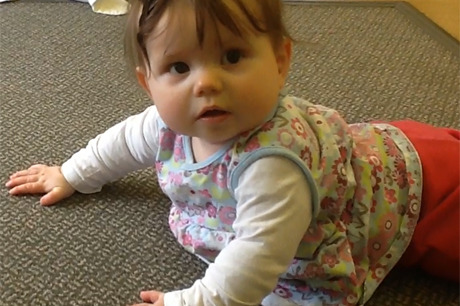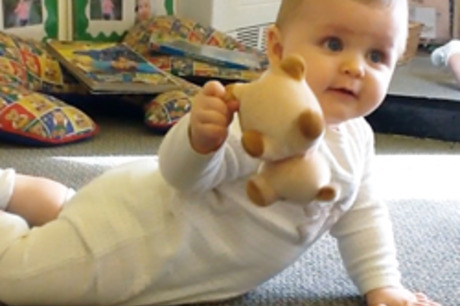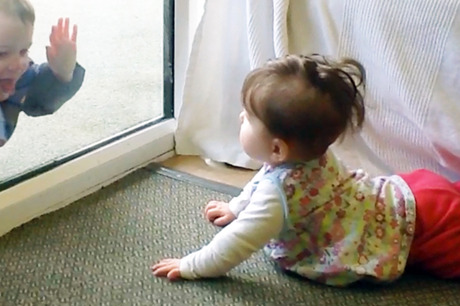spend too little time playing in this way. Andrea Vaughan explains how
her setting has been working to increase parent awareness.

Everton Nursery School and Family Centre in Liverpool has developed a Tummy Time play programme for local parents to combat early signs of delay and later developmental problems in their children.
The Lullaby Trust's Back to Sleep campaign, in 1991, successfully encouraged parents to lay their babies to sleep on their backs, rather than their tummies, to reduce the risk of cot death. An unintended consequence of the campaign, however, is that many babies nowadays spend little time on their stomachs and miss out on this developmentally crucial form of play.
In 2006, the Association of Paediatric Chartered Physiotherapists reported that only a fifth (22 per cent) of babies under six months old experienced regular time on their tummy.
At Everton, staff have observed this trend and also noticed that babies nowadays are spending long periods strapped in buggies or car seats, further reducing children's chances of 'tummy time'. Parents have reported their concerns about various aspects of their child's development stemming from this lack of 'tummy time' play, principally:
- a flat spot appearing at the side or back of the baby's head (known as positional plagiocephaly or flat head syndrome)
- the baby's head turned persistently to one side (torticollis)
- babies being unable to lift up their head by three months old
- older babies not yet showing signs of rolling, sitting or crawling
- babies becoming bored and frustrated when lying on their backs.
Centre staff began to address the lack of tummy time during 'stay and play' sessions, by encouraging parents to place their babies on their tummy when they were awake. However, at this pilot stage staff realised that more work was needed to embed this practice at home.

TUMMY TIME IN NURSERY
In our on-site baby and toddler nursery room, we already have a strongly embedded routine of placing babies on their tummies to play. Babies who are new to this kind of play are given short bursts of time on their tummy to accustom them to it. With their key person lying face-to-face with them on the floor, babies soon learn that being on their tummy is fun.
Tummy time in nursery has proven to help babies reach developmental milestones, by increasing their confidence, resilience and independence, so enabling them to become motiv- ated to explore their surroundings as they learn to control their bodies. Babies access tummy time when they are awake and ready to play.
The rules of tummy time in nursery are very simple:
- Ensure the baby is awake, alert and happy (not hungry, tired or upset).
- Place a rug on the floor or use a clean carpeted area.
- Place some objects or a non-breakable mirror in front of baby for motivation.
- Lie on the floor face-to-face with the baby.

BENEFITS
The benefits of tummy time are well researched, and staff have also been able to see at first-hand the developmental differences between babies enjoying this kind of play in nursery and those that are missing out.
Born to Move (Haynes, 2012), for example, highlights the increase in babies crawling from the national average of 30 per cent to 94 per cent of babies crawling following using tummy time.
It greatly enhances motor control by helping to:
- extend and strengthen the muscles that run the length of the spine and are needed to sit, crawl and walk
- encourage head lifting, reaching, rolling, pushing backwards and grasping
- strengthen neck, arms and core muscles when a baby pushes up from the floor. This also opens up the chest cavity to aid deeper breathing.
- prevent positional plagiocephaly and torticollis. If left untreated, babies are at risk of other problems such as asymmetrical facial features and feeding problems.
- the baby to experience gravity as they push their head upwards. They also experience friction as they attempt to move their body.
- develop fine motor skills needed for pincer grip when holding a spoon for feeding and for writing.
Tummy time also enables babies to:
- engage in sensory experiences close to the face and mouth, making it easier for them to explore and learn about the world around them (sensory integration)
- focus on objects and faces close at hand, and avoids them having to them to look up at the ceiling (visual processing)
- interact with other babies and adults (social development)
- learn about the size and the shape of their body and how it fits into a space (proprioceptive system)
- think for themselves and work out how to lift their head to focus on the adult beside them and to find ways of reaching objects (cognition and environmental awareness)
- grow in confidence and have a sense of enjoyment, satisfaction and achievement (psychological effects)
- improve non-verbal communication such as eye contact and smiling and language development by increased interaction with adults (communication and language).
In light of these many benefits, Kent Community Health (NHS) launched an app in May promoting 'awake tummy time' from birth. It is packed with advice, tips and games that parents can play with their child to promote being active from birth.

PARENT PROGRAMME
Based on the research and our own observations, Everton outreach staff developed a programme to support parents to increase their knowledge for providing tummy time at home.
Underlying causes
First on the list was tackling the aspects of family life that prevent tummy time, principally:
- prolonged use of car seats. Local parents often carry their babies in car seats to attend appointments or go shopping. Once home, they often carry the child from the car to the house, where the baby will continue to sleep or be carried around in the seat. So, we now advise parents to: carry their baby in their arms where possible; remove their baby from the car seat as soon as they reach home or their destination, and; only use the car seat in the car and not as a place to sleep at home.
- prolonged use of buggies. On many home visits, staff observed buggies being used as 'beds' for children to nap and as feeding chairs, raising concerns about the longer-term physical and social problems that could arise from spending prolonged periods in sedentary positions with few face-to-face interactions.
Four sessions
The programme we developed - of four sessions over four weeks - covered elements of practice, theory and the overall benefits of tummy time.
1. What is tummy time about?
The main aim of this first session was to help parents to understand:
- the main messages of 'Back to Sleep' and 'Awake Tummy Time'
- the importance and benefits of tummy time
- what tummy time looks like and appropriate places for this kind of play
- how to begin tummy time and establish a daily routine
2. Knowing your child and making them comfortable
In this session, parents:
- share their tummy time experiences with the group (this was also included in sessions three and four)
- explore a range of ways in which tummy time can take place
- learn about the importance of talking to and engaging with their child
3. Routines
Here, parents learn about:
- the importance of fitting in with their child's routine to keep tummy time consistent
- how to establish a Tummy Time Minute every day at home
4. Singing songs
This final session helps parents to learn and become confident in singing songs and nursery rhymes during tummy time.

Impact
Using preand post-tracking outcomes questionnaires, we have found that most parents have little awareness of the benefits of tummy time at the outset, but all show increased awareness of the benefits by the end of the programme.
Similarly, we measure how much tummy time is used at home. Pre-programme results show that parents never or rarely use tummy time. By the end of the programme, however, all (100 per cent) parents who took part now use tummy time at home as part of their daily routine.
All parents who attend the programme are given a free swim voucher for one session as a reward for attending the programme and to keep practising tummy time in the water.
The plan is to continue to roll out the programme to all babies under six months old and to ensure that health visitors promote the programme at the centre during their initial birth visits and to refer families onto the programme.
Andrea Vaughan is early intervention co-ordinator at Everton, and has developed a parent DVD and parent booklet to accompany the programme to support parents in understanding tummy time
MORE INFORMATION
Born to Move by J Haynes (2012), Department of Health, www.gov.uk
Kent Community Health's tummy time app, www.kentcht.nhs.uk/home/about-us/news/born-to-move-nhs-app-launched-to-empower-parents.









